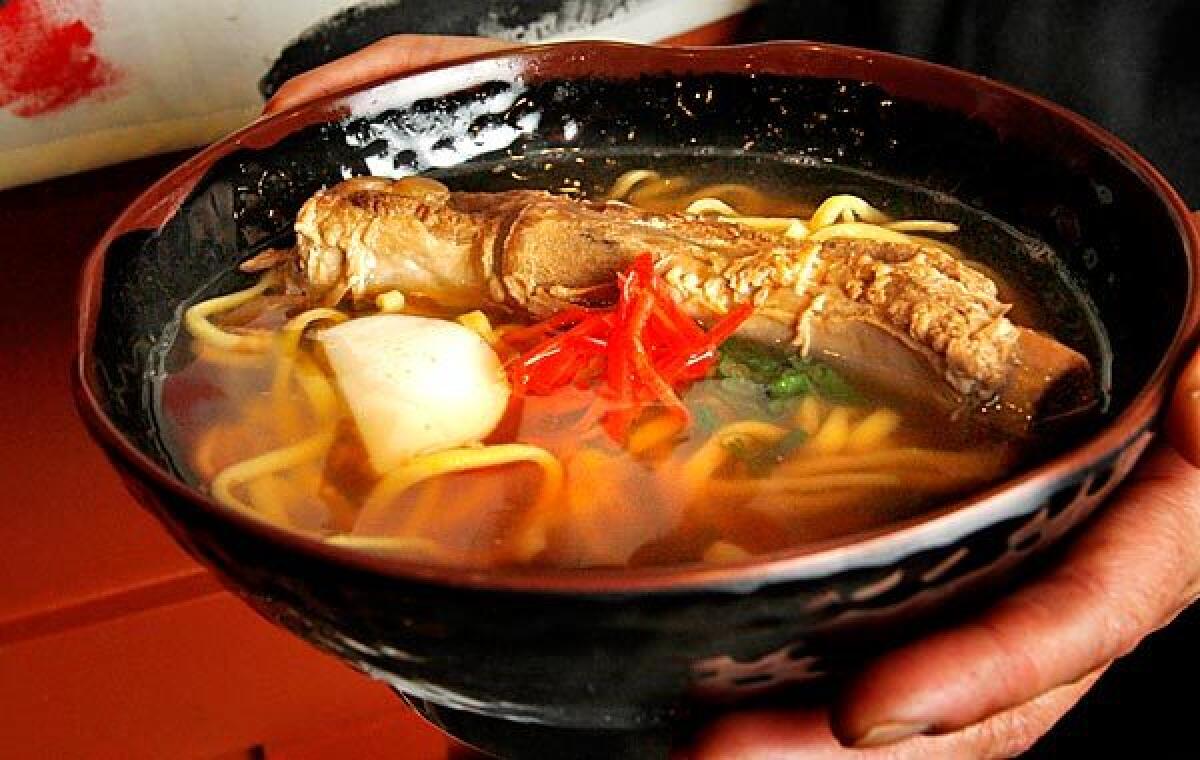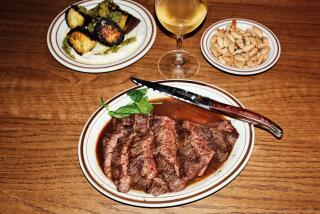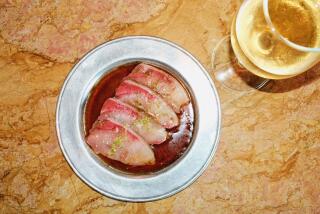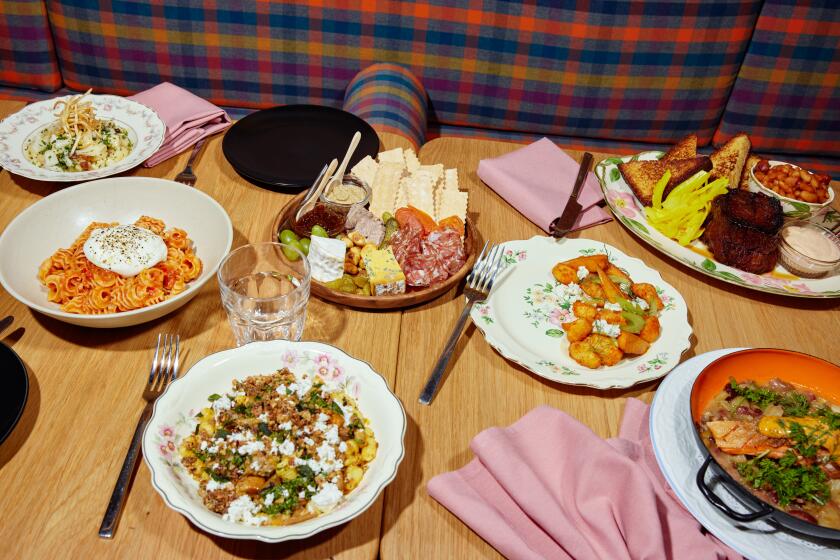The Find: Habuya in Tustin

- Share via
A skein of flat, linguine-like noodles and shards of ginger are so fine they all but dissolve in the broth. There are pork ribs, with brawny slabs of meat thick as a Little Leaguer’s baseball bat. But the soki soba is all about the bones, marrow-filled ribs stewed until they can be eaten.
If there’s one thing Mayumi Vargas wants everyone to know about her native Okinawa, it’s the island chain’s affinity for pork. And at Habuya, Vargas’ new Okinawan restaurant in a hidden corner of a Tustin mini-mall, pork is a uniting force.
Okinawa is a Japanese prefecture apart. Although the subtropical islands have been absorbed nominally into Japan’s national identity, they remain culturally individualistic. Habuya reflects that in its humble cooking, which is less like that of a refined seaside restaurant and more like that of a salt-licked coastal pub.
In traditional izakaya style, the restaurant is built on small, shared plates. You can approximate an assembly of banchan (the appetizers before a Korean meal) with the bitter melon kimchi. A subtle chile sting mitigates some of the gourd’s potentially palate-punishing acridity. It’s not a kimchi limp with fermentation; rather, it’s one barely touched by time, the bitter melon still crisp and delicate and full of its own flavor.
Add to that an order of firm Okinawa-style tofu. One cube comes slicked with squid ink; others are topped with tiny, clear-eyed fish and dabbed with plum paste. Those ubiquitous Okinawan purple sweet potatoes arrive next, fried in fat wedges that could use a few more crystals of salt. Then it’s a plate of sautéed shishito peppers buried under a pile of dried bonito flakes.
Plied with a bottle of Orion beer and a splash of sake, most tables snack on goya chanpuru, bitter melon stir-fried with eggs and Spam. Chanpuru, simply a “mix,” is an essential Okinawan preparation, a sort-of scramble also available here with wheat gluten and more Spam, that processed vestige of American military occupation.
Everyone at Habuya eventually turns to pork. Rafutei, appearing for now only as an occasional special, grabs maybe the most attention. The long-simmered pork belly arrives just moments from complete collapse, peeling easily apart in tender strata of fat and flesh. The taste of soy penetrates the pork all the way down to what must be the cellular level.
There’s always soki soba. The noodle soup is probably the dish you’re most likely to find in the dining room, a mob of wide-mouthed bowls exhaling enough steam to generate localized weather systems. The noodles are something of a misnomer, more similar to flat, wheat-based kishimen than typical buckwheat soba. But the soki soba is all about those pork ribs. They’re simmered for six hours, the precise time it takes for the meat to free itself from the bones and for those ribs to soften into pork quintessence.
The restaurant’s shio ramen is a testament to restraint. The noodle soup is flavored ever so subtly with Okinawan sea salt, just enough to buoy the slivers of green onions and slices of fatty pork. Added to the ramen, and indeed every noodle soup, should be a few splashes of Habuya’s chile-infused sake, a shot of sweet, mild spice.
There’s hirayachi — a thin vegetable pancake not unlike the chubbier okonomiyaki — and takoyaki too, molten balls of batter concealing a few nubs of octopus. Vargas extols Okinawan cuisine for its age-extending effect, but Habuya is no den of low-calorie living — it’s a restaurant of simple, communal pleasures.
HABUYA
LOCATION: 14215 Red Hill Ave., Tustin; (714) 832-3323.
PRICE: Appetizers and salads, $2.50 to $6.50; stews and stir-fries, $4 to $6.50; grilled and fried dishes, $3 to $7.50; noodle dishes, $7.50 to $8.50.
DETAILS: Open 5:30 to 11 p.m. Monday to Saturday. Closed Sunday. Lot parking. Credit cards accepted. Beer, wine, sake.
More to Read
Eat your way across L.A.
Get our weekly Tasting Notes newsletter for reviews, news and more.
You may occasionally receive promotional content from the Los Angeles Times.










